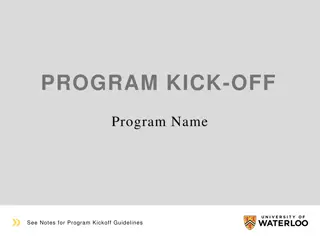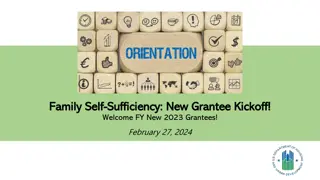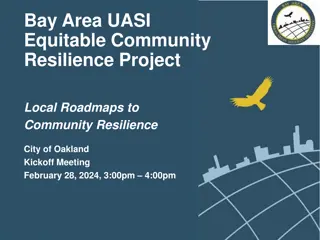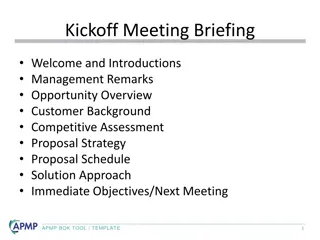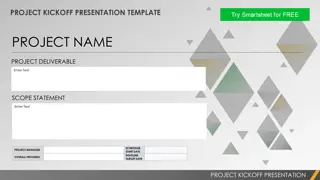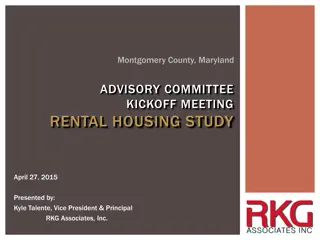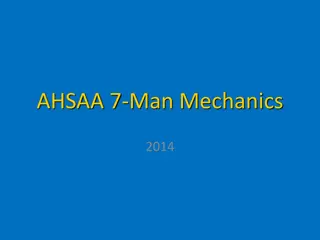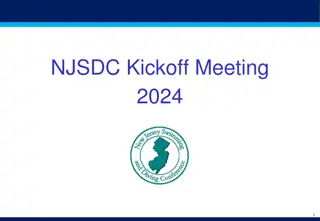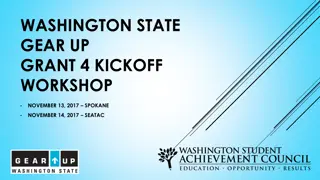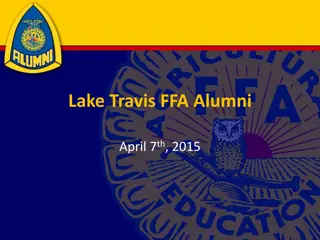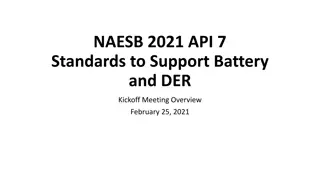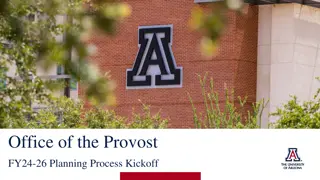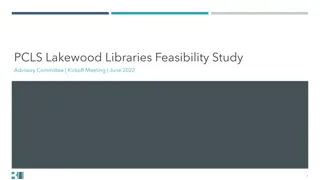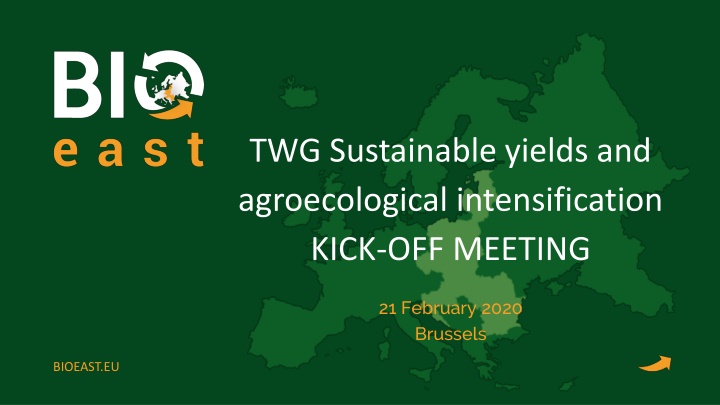
Promoting Agroecological Intensification in European Research Area
Explore the launch of the TWG Sustainable Yields and Agroecological Intensification, aiming to strengthen the European Research Area, foster collaboration, and enhance policy-making in the agroecology sector. Learn about the key players, initiatives, and the importance of working together towards common goals in bioeconomy advancement.
Uploaded on | 0 Views
Download Presentation

Please find below an Image/Link to download the presentation.
The content on the website is provided AS IS for your information and personal use only. It may not be sold, licensed, or shared on other websites without obtaining consent from the author. If you encounter any issues during the download, it is possible that the publisher has removed the file from their server.
You are allowed to download the files provided on this website for personal or commercial use, subject to the condition that they are used lawfully. All files are the property of their respective owners.
The content on the website is provided AS IS for your information and personal use only. It may not be sold, licensed, or shared on other websites without obtaining consent from the author.
E N D
Presentation Transcript
TWG Sustainable yields and agroecological intensification KICK-OFF MEETING 21 February 2020 Brussels BIOEAST.EU
COORDINATORS OF THE TWG Hungarian Ministry of Agriculture (HuMA) Hungarian Ministry of Agriculture (HuMA) Anik Juh sz, Deputy State Secretary (aniko.juhasz@am.gov.hu) L via Kr nitz & Zs fia Kunya research officers (livia.kranitz@am.gov.hu; zsofia.kunya@am.gov.hu) Role: overall coordination and support Research Institute of Organic Agriculture ( MKi) Research Institute of Organic Agriculture ( MKi) D ra Drexler, director (dora.drexler@biokutatas.hu) Korinna Varga, research associate (korinna.varga@biokutatas.hu) Role: professional support BIOEAST.EU
Who is who? Tour de table Introduction of participants BIOEAST.EU
Why do we need a thematic working group? Presenter: Anik Juh sz, Deputy State Secretary HuMA BIOEAST.EU
BIOEAST INITIATIVE Central Central and Initiative Initiative for started by V4 11 CEE countries political agreement between agricultural and research ministries www.bioeast.eu National National NCPs NCPs: : https://bioeast.eu/contacts/ and Eastern Eastern European for bioeconomy bioeconomy European BIOEAST.EU
WHY DO WE NEED TWG IN GENERAL? To strengthen the European Research Area strengthen the European Research Area and create synergies different countries research and innovation needs/topics. Effective lobbying level level only works as a macro-region, not as separate countries (e.g. in SCAR, strategic programming of H2020) create synergies between the lobbying at at EU EU To connect the public administration to the bioeconomy networks connect the public administration to the bioeconomy networks at the EU level with regard to the ongoing research and innovation. Cooperation policy policy is a benefit for both. Cooperation between between research research and and To facilitate knowledge transfer knowledge transfer and education respective thematic field. education among the different actors in the BIOEAST.EU
WHY DO WE NEED TWG SPECIFICALLY? To support support the policy-making and lobbying. To support the work of the BIOEAST Governing Board in preparing specific area oriented strategic documents, especially the S Strategic R Research and esearch and I Innovation nnovation A Agenda (SRIA) macro-regional common research and innovation priorities in various thematics. To pave the way for the creation of European Partnerships Partnerships (see presentation from previous session) or other joint programing initiatives or other joint programing initiatives by setting up structures with the involvement of public administrations and other stakeholders. At national level they help policy in decision- making and developing strategies. Building Building connections connections and and networks Bigger chance of getting into consortiums. the BIOEAST BIOEAST Board Board ( (ministries ministries) ) in National National mirror groups groups (BIOEAST HUB) (BIOEAST HUB) mirror BIOEAST BIOEAST Thematic Thematic working working groups ( (TWGs TWGs) ) groups trategic genda (SRIA) - to set European National bioeconomy National bioeconomy strategies strategies development development SRIA networks. . Influence Influence on and programmes and programmes on EU EU policies policies BIOEAST.EU
Working Working together together for years years until until final SRIA SRIA for 2,5 final 2,5 TWG TWG Forestry Forestry (SK) (SK) thematic SRIA TWG TWG Food Foodsystems systems (PL) (PL) thematic SRIA TWG TWG Bioenergy Bioenergy and added addedvalue value products and high high products (HR) thematic SRIA (HR) SRIA SRIA TWG TWG Sustainable Sustainable yields agroecological agroecological intensification yields and intensification (HU) and thematic SRIA (HU) TWG TWG Freshwater Freshwater (CZ?) (CZ?) thematic SRIA BIOEAST.EU
WHO ARE THE MEMBERS? We have delegates from all 11 BIOEAST countries. TWG is open to various experts from ministries, institutions, academia, NGOs and the business sector with an interest in the activities of the TWG. Important: members should represent country positions represent country positions, not individual institution interests. Nomination of new members: through NCP! BIOEAST.EU
Presentation of Terms of Reference and topic suggestions of countries Presenter: Korinna Varga, research associate MKi BIOEAST.EU
TERMS OF REFERENCE sets out the working arrangements for the BIOEAST Agro- ecological intensification Working Group (BAeWG) provides information about provides information about and for and organization, coordination, members, timeline, planned activities and outcomes for the the BAeWG BAeWG: its governance BIOEAST.EU
TERMS OF REFERENCE BACKGROUND Agriculture and the food sector provides approx. 63% employment employment (agriculture 19%, food sector 44%), which constitutes 76% of its total turnover of the bioeconomy (agriculture 54%, food sector 22%)(JRC 2018). However, the global challenges of climate change, world population growth, climate change, world population growth, consumption patterns, agriculture s pressure on the environment etc. consumption patterns, agriculture s pressure on the environment etc. 63% of Europe s total 76% of its total turnover total call for changes to transition current agricultural call for changes to transition current agricultural practices and food systems to be sustainable in practices and food systems to be sustainable in the long term the long term AGROECOLOGY AGROECOLOGY BIOEAST.EU
TERMS OF REFERENCE BACKGROUND What is AGROECOLOGY? agroecology is a dynamic concept promote closed cycles with minimal negative externalities and stress the importance of local knowledge and participatory processes and participatory processes that develop knowledge and practice through experience, as well as more conventional scientific methods [ ]. Agroecological approaches recognize that agrifood systems are coupled social ecological systems from food production to consumption and involve science, practice and a social movement, as well as their holistic integration, to a social movement, as well as their holistic integration, to address food and nutrition security dynamic concept that favours the use of natural processes, limit the use of purchased inputs, use of natural processes, limit the use of purchased inputs, stress the importance of local knowledge involve science, practice and address food and nutrition security (HLPE 2019: 39) BIOEAST.EU Overview of the different levels of agroecology and corresponding principles (Agroecology Info Pool https://www.agroecology-pool.org/methodology/)
TERMS OF REFERENCE BACKGROUND Why Why do Effective adaptation to the impacts of climate change ( Effective adaptation to the impacts of climate change (resilience of farmers and rural communities, diversification of agroecosystems, agroforestry systems, water conservation, soil health and agrobiodiversity, adaptive capacity of supporting institutes) ) Enhace the efficiency and quality of agriculture and food systems in the Enhace the efficiency and quality of agriculture and food systems in the macro macro- -region region Open up new areas Open up new areas to explore for the bioeconomy and bio-based products CAP and Horizon Europe 2021 CAP and Horizon Europe 2021- -27 27 put great emphasis on the support of environmentally friendly production methods such as agroecology, conservation agriculture etc. do we we need need Agroecology Agroecology in in the the CEE CEE macro macro- -region region? ? BIOEAST.EU
TERMS OF REFERENCE BAEWG OBJECTIVES TO STUDY AND SYNTHETIZE NATIONAL AGRICULTURAL RESEARCH AND INNOVATION STRATEGIES IN ORDER TO SUPPORT THE ELABORATION OF SRIA TO SET-UP A NETWORK OF RELEVANT STAKEHOLDERS OF THE BIOEAST COUNTRIES TO COLLECT AND DISCUSS EXPERIENCES WITH AGROECOLOGICAL INTENSIFICATION R&I INITIATIVES. TO STIMULATE A DISCOURSE ON CEE AGRICULTURAL SECTOR DEVELOPMENT IN LIGHT OF TARGETED SUSTAINABLE YIELDS, AGROECOLOGICAL FARMING PRACTICES, AND THE AIM TO STRENGTHEN COMPETITIVENESS AND CREATE JOBS. TO SEEK ALIGNMENT OF NATIONAL AGENDAS, INITIATIVES, FINANCING SOURCES AND INVESTMENTS IN THE CEE REGION AND BROADER IN THE EU FOR CREATING AN ENABLING ENVIRONMENT FOR THE SRIA. BIOEAST.EU
TERMS OF REFERENCE BAEWG OBJECTIVES TO COLLECT GOOD AGROECOLOGICAL EXAMPLES FROM THE MACRO-REGION TO MOBILISE THE BIOEAST BAEWG MEMBER MINISTRIES TO IMPLEMENT POLICY PILOTS FOR AGROECOLOGICAL SYSTEM DEVELOPMENT (E.G. BY SETTING UP "LIVING LABS) TO SPECIFY TO CONTRIBUTE TO THE PROPOSED EUROPEAN PARTNERSHIP ON AGROECOLOGY WITHIN THE NEXT RESEARCH AND INNOVATION FRAMEWORK PROGRAMME, HORIZON EUROPE TO CONTRIBUTE TO THE PROGRAMMING OF THE NATIONAL STRATEGIC PLAN OF THE COMMON AGRICULTURAL POLICY IN THE RELATED INVESTMENT COMMUNICATION AND DISSEMINATION TOOLS AND CHANNELS FOR SHARING BEST PRACTICES IN RESEARCH AND INNOVATION TARGETING SUSTAINABLE YIELDS AND AGROECOLOGY BIOEAST.EU
TERMS OF REFERENCE RESEARCH TOPICS TO BE ADDRESSED BY THE BAEWG Research Topics Soil fertility, soil biodiversity and microbial communities Transition to chemical pesticide-free agriculture Enhancing the potential of genetic resources in agro-ecosystems Crop and production diversification Precision farming and digital technologies Animal health, nutrition Local food systems and sustainable supply chains Rural development and innovation management BIOEAST.EU
TERMS OF REFERENCE ROLES AND RESPONSIBILITIES Members of the BAeWG shall: attend all scheduled BAeWG meetings (webex, tele-conferences) share all communications and information, documents that are relevant to their work, across all BAeWG members ( (national national strategies strategies, , policies policies, , programmes programmes, , action make timely decisions and take action, as appropriate, to enable the work of BAeWG in an effective manner towards defined outcomes action plans plans!!) !!) Members of the BAeWG will expect from the coordinator: that each member will be provided with complete, accurate and meaningful information in a timely manner to be given reasonable time to make key decisions to be alerted to potential risks and issues that could impact the project, as they arise open and honest discussions, without resort to any misleading assertions BIOEAST.EU
TERMS OF REFERENCE GOALS AND EXPECTED RESULTS IN 2020 To have at least two To adopt the TWG Terms of Reference Terms of Reference until April 2020 To prepare a first draft thematic SRIA first draft thematic SRIA until June 2020 based on the framework for the SRIA development and to develop it further To choose topics for thematic studies topics for thematic studies until June 2020; the studies will support the creation of the thematic SRIA. two face to face TWG meetings face to face TWG meetings per year BIOEAST.EU
ROADMAP AND ACTION PLAN Roadmap 2020 2021 2022 Description of activities Delegation of members Mapping research topics for the SRIA Kick-off meeting of the TWG Development of the Terms of Ferences and Action Plan Framework for SRIA development received from Task Leader Second meeting of TWG First draft of SRIA (Agroecology) Finalizing the Terms of References and Action Plan ToR adopted by the Board Development of SRIA (Agroecology) Commission of studies relevant for the SRIA (Agroecology) First draft of the BIOEAST SRIA SRIA validation workshops (3) Creation and functioning of national level-mirror groups for SRIA (Agroecology) input Third meeting of TWG 1 2 3 4 5 6 7 8 9 10 11 12 1 2 3 4 5 6 7 8 9 10 11 12 1 2 3 4 5 6 7 8 9 10 11 12 BIOEAST.EU BIOEAST/bioeconomy final Congress
National stakeholder groups behind the TWG the Hungarian case example Presenter: Korinna Varga research associate MKi BIOEAST.EU
NATIONAL MIRROR GROUPS BEHIND THE TWG All member countries are expected to form national mirror groups All member countries are expected to form national mirror groups based on the proposed research topics to gather national inputs for based on the proposed research topics to gather national inputs for the SRIA the SRIA Hungary: Hungary: (group of 5 (group of 5- -6 members, selected by expertise and competence) 6 members, selected by expertise and competence) 1. 1. 2. 2. Soil biodiversity mirror group Soil biodiversity mirror group Pesticide Pesticide- -free agriculture mirror group free agriculture mirror group BIOEAST.EU
Support for functioning of the TWG Presenter: Zs fia Kunya, research officer HuMA BIOEAST.EU
SUPPORT FROM THE BIOEASTSUP PROJECT H2020 Coordination and Support Action (not research) runs for 3 years (october 2019 September 2022). 11 BIOEAST countries (+DE, FI). https://bioeast.eu/partners/ 2 main objectives of the project: 1. 1. Develop Develop macro macro- -regional regional Strategic (SRIA) (SRIA) 2. 2. To To support support national national bioeconomy bioeconomy strategy Strategic Research and Research and Innovation Innovation Agenda Agenda strategy development development BIOEASTsUP BIOEASTsUP provides provides framework framework and and guidance guidance for for TWG TWG to to develop develop the the SRIA. SRIA. BIOEAST.EU
We have a common goal here, therefore BIOEAST countries are primarily responsible to support the We have a common goal here, therefore BIOEAST countries are primarily responsible to support the functioning of TWGs. functioning of TWGs. TWG members will be expected to travel (at least) 2x/year to meetings organised in CEE countries. TWG members will be expected to travel (at least) 2x/year to meetings organised in CEE countries. BIOEASTsUP will provide SOME this is mainly for organisational cost and guidance for SRIA this is mainly for organisational cost and guidance for SRIA. BIOEASTsUP is not able to fund travels for TWG members. for TWG members. SOME support for the functioning of TWGs in the time period 2019 2022 BIOEASTsUP is not able to fund travels TWG members who are also in the consortium of BIOEASTsUP project have some cost for their travels in their budget lines (not all). However, for TWG members who are not involved in the BIOEASTsUP project and have problem to finance their travels: get in contact with your ministries (through NCP) to find a solution for financing. We We will jointly jointly with will try with other try to to be be very other TWGs TWGs etc.) very cost cost effective effective! ( ! (organising etc.) organising meetings meetings in in CEE, CEE, back back- -to to- -back back with with other other events events, , BIOEAST.EU
SUPPORT FOR COMMUNICATION Communication and Expert Team (CET) in the BIOEASTsUP project Coordinator of CET: Livia Kr nitz HuMA Please send any national event/new strategy document etc. which you would like to share with the BIOEAST stakeholders or in the newsletter. - We will have a wide network of stakeholders in a database, will be available on the BIOEAST website. BIOEAST.EU
Workshop working around the topic suggestions Presenter: Korinna Varga, research associate MKi BIOEAST.EU
WORLD CAF 5 Two groups are formed. 30 Groups discuss the following two questions 1. 1. Are some topics still missing from the identified priorities? What might be Are some topics still missing from the identified priorities? What might be added resp. excluded (e.g. are social /life/economic sciences represented added resp. excluded (e.g. are social /life/economic sciences represented well?) well?) 2. 2. Within the identified main topics, do you have suggestions for subthemes? (E.g. Within the identified main topics, do you have suggestions for subthemes? (E.g. within the topic of zero chemical pesticide use, a research theme on resistance within the topic of zero chemical pesticide use, a research theme on resistance breeding could be a subtheme) breeding could be a subtheme) 30 Tables swop, the moderators explain the ideas discussed till now, and another half an hour is available for further reflections and additional thoughts. 10 The two moderators report back to the plenary in 5-5 BIOEAST.EU
NEXT STEPS Setting up core group (4-5 people who will draft the SRIA) Approval of ToR by Board in March (please comment the ToR!) Have a draft concept paper for SRIA by April Next meeting to discuss draft SRIA: June 2020 Budapest? BIOEAST.EU
THANK YOU FOR YOUR ATTENTION BIOEAST.EU



